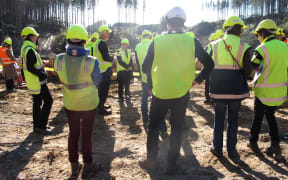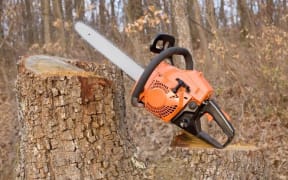The proposed National Environmental Standard does protect areas prone to erosion, the Forest Owners Association says.
Submissions to the Ministry for Primary Industries on the proposed National Environment Standard (NES) for plantation forestry has closed and the chair of the association's environment committee is pushing for it to be introduced.
Some Māori and councils have objected to the National Environment Standard, saying it will slacken controls on damage to the environment from the industry.
Chair of the association's environment committee Peter Weir said Māori are very significant forest owners by way of Treaty settlements and receiving large tracts of Crown forest lease land.
Mr Weir said the Lake Taupo Forest Trust is one of the groups supporting the Forest Owners Association's stance as well as other significant Māori owners.
"It does lift the bar in relation to stream crossings, in relation to staying out of streams during the fish migration season, but as a package we can accept that because it is doing the right thing and because it will make our training and our envrironmental performance better.
"Reducing sediment to freshwater is important, this NES stretches us in that direction. Yes, we'll incur some extra costs in that, but we'll deliver better environmental outcomes with this NES in place."
Mr Weir said council rules for forestry are a muddle and mishmash of rules which vary from district to district.
"We have 68 different district councils individually trying to regulate forestry their own way and that's overlain by 16 regional council that create regional policy statements that direct the district councils as to how they might regulate that.
"So if we compare and contrast Hawkes Bay and Gisborne: Hawkes Bay Regional Council don't like it because they will be required under the NES to issue resource consents for harvesting and roading on some of the most erodable land in New Zealand where previously they've never done that.
"On the flipside, Gisborne [District Council] on exactly the same geology don't like it because they will end up issuing less resource consents for that same terrain - I'm thinking the areas either side of Wairoa - where currently two completely polar opposite regulatory regimes regulating the same activity on the same geology."
The Hawkes Bay Regional Council responded with the following statement:
"Sites such as unmapped waahi tapu sites, unmapped significant indigenous flora and fauna, other than outstanding, but still significant freshwater bodies and natural features and landscapes (as well as sensitive receiving environments) should all be included as matters where councils can apply more stringent rules.
Should it come into effect, council is not against an NES for forestry that would require us to issue resource consents. What we would support is an NES giving us more ability to impose stricter requirements in areas where the climate and terrain need stronger management."
Te Manu Korihi approached Local Government New Zealand and the Gisborne District Council for comment.





